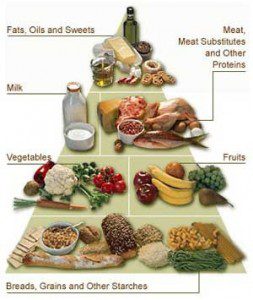Macronutrients – The Body’s Energy Supply
 In this description, macronutrients supply energy, measured in calories, 55% to 60% from carbohydrates, 25% to 30% from fats, and 5% to 10% from proteins.
In this description, macronutrients supply energy, measured in calories, 55% to 60% from carbohydrates, 25% to 30% from fats, and 5% to 10% from proteins.
When one talks about a normal metabolic rate—being, on average, 25 to 30 kilocalories per kilogram of body weight per day (25-30 kcal/kg/d)—one is describing an average person’s energy requirement: the energy necessary for cell function, muscle function, tissue repair.
In a healthy metabolism, proteins provide little of the energy the system uses but rather the raw materials for protein synthesis in cell and muscle function and tissue repair. Calories from carbohydrates that are above and beyond metabolic needs are stored as fats that can be called upon when the energy requirements of the body mandate.
Exercise is an integral component of a healthy metabolism to prevent the storage of excess fats and provide healthy stressors that beneficially challenge many parts of the overall system. A proper balance of macronutrients is necessary for a healthy diet to help the body’s energy and raw materials to function optimally.
Macronutrients, in the presence of adequate oxygen (to assist in energy production), micronutrients, and water, enter the metabolic pathways under the direction of hormonal signals.
Hormones are, in essence, messengers that regulate both anabolic processes, those involved in growth and repair, and catabolic processes that break down components and tissues during normal metabolic processes.
Hormones are derived from proteins and fats and can include carbohydrate side chains conferring a variety of functionalities.
Micronutrients: Cofactors to Energy Production and Protein Synthesis
A variety of micronutrients are required in a healthy diet. They act as cofactors integral to the enzymes involved in cell functions like DNA and protein synthesis, cell proliferation, immunity, and anti-oxidation processes. Zinc, for instance, is a cofactor for RNA and DNA polymerase and is involved in DNA synthesis. Zinc is a critical cofactor in matrix metalloproteinase (active in wound repair), aids in immune function and collagen synthesis, and stimulates epithelial (skin and membrane tissue) repair and growth.
Other micronutrients include vitamins A, C, and E, with the B-complex vitamins: thiamine, riboflavin, niacin, B6, and folate.
Necessary Micronutrients also contain Trace Elements.
- Copper – maintains homeostasis and collagen-elastin crosslinking.
- Selenium – cofactor in fat metabolism and key anti-oxidation functions
- Manganese – a cofactor to enzymes in the Krebs cycle and protein metabolism
- Iron – a crucial component of red blood cells; and calcium for teeth and bone health.
These are a few of the critical nutrients a healthy diet must provide.
Click here to look at how someone following a vegan diet achieves those recommendations. Consider these vital metabolic requirements for a healthy diet. We trust you enjoyed this article about Micronutrients and Macronutrients and their makeup.
Also Read:
Low Carb


